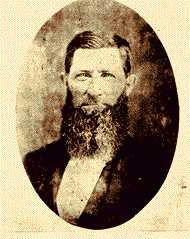Abraham Merideth was born on the 10th of September 1836 in Edmonson County.  He was born to Joseph Abraham Meredith and Elizabeth Sanders Meredith who were both in their mid 40's at the time. The 1840 census shows the family settled in Edmonson County. In addition to the parents, there were 8 boys listed, no girls. One can only presume these were Abraham and his older brothers.
He was born to Joseph Abraham Meredith and Elizabeth Sanders Meredith who were both in their mid 40's at the time. The 1840 census shows the family settled in Edmonson County. In addition to the parents, there were 8 boys listed, no girls. One can only presume these were Abraham and his older brothers.
 He was born to Joseph Abraham Meredith and Elizabeth Sanders Meredith who were both in their mid 40's at the time. The 1840 census shows the family settled in Edmonson County. In addition to the parents, there were 8 boys listed, no girls. One can only presume these were Abraham and his older brothers.
He was born to Joseph Abraham Meredith and Elizabeth Sanders Meredith who were both in their mid 40's at the time. The 1840 census shows the family settled in Edmonson County. In addition to the parents, there were 8 boys listed, no girls. One can only presume these were Abraham and his older brothers.
On Christmas Eve, 1861, Abraham mustered-in the Union Cavalry, 4th Kentucky, having enlisted a month earlier. On the 28th, he appears on the company roll at Camp Anderson which was located at Lebanon Junction, Ky. In March, the company proceeded toward Nashville, TN. Command was given to Col. Smith in May, and they engaged the Confederate cavalry several times. The most significant of these was at 4 am on May 5th at Lebanon, TN against Morgan. In the summer of 1862, Pvt. Meridith was promoted to corporal. However, in April 1864 he was demoted back to private. His enlistment described him as dark complected with black eyes and black hair.
The 4th Kentucky was involved in the pursuit of General Bragg into Kentucky as far as Bowling Green. In the winter of 1863, they returned to Nashville. In Tennessee, they engaged in several contests against the troops of Van Dorn and Forrest. At the Battle of Chicamauga, 9/20/1863, they were involved in heavy fighting losing 90 men and 4 officers.
For the beginning of the Atlanta campaign, Copl Meridith was assigned to the 2nd Kentucky Cavalry but eventually rejoined the 4th in April at the time of his demotion. He fought throughout Georgia and was sent home to Kentucky at the end of the year to be mustered-out.
He returned to the farm and in 1868 he married Minisa Crouch, the daughter of a James and Sarah Crouch. James was a farmer, Sarah, a midwife. Minisa picked up the trade of midwifery and herbs from her mother. When Minisa later would apply for pension assistance, Sarah testified that she delivered six children belonging to Minisa and Abraham in addition to the over 600 children Sarah had delivered professionally. These children were James E. Merideth (father of John Edsel Merideth) b. 1873, Flora Bell b 1874, Noah Clint b. 1876, Pernia Ann b. 1878, Leonard Bert b. 1880, and William A. born 1885.

Family lore tells that Abraham didn't get along with the other Meredith's in the area and so changed the spelling of his name. It appears as both Merideth and Meridith in his civil war papers. Although, he weathered many battles in the war, his life was still cut short at 56. On Nov 5, 1892 he was killed by an explosion at a sawmill. His grandfather had brought the clan to Kentucky almost 100 years beforehand and had operated one of the first Gristmills in the region. Some stories I have seen say that Abraham was just riding by on horseback at the time of the accident. Whatever the cause, he left 6 children ages 7 to 19. Mincy followed him six years later at the age of 52. They were buried in Old Cub Run cemetery in Hart County, Ky.